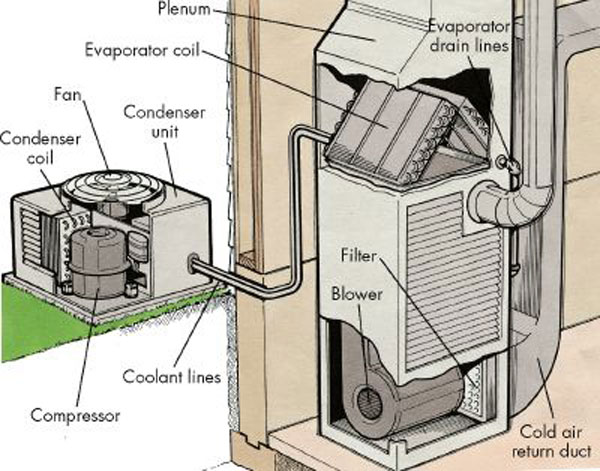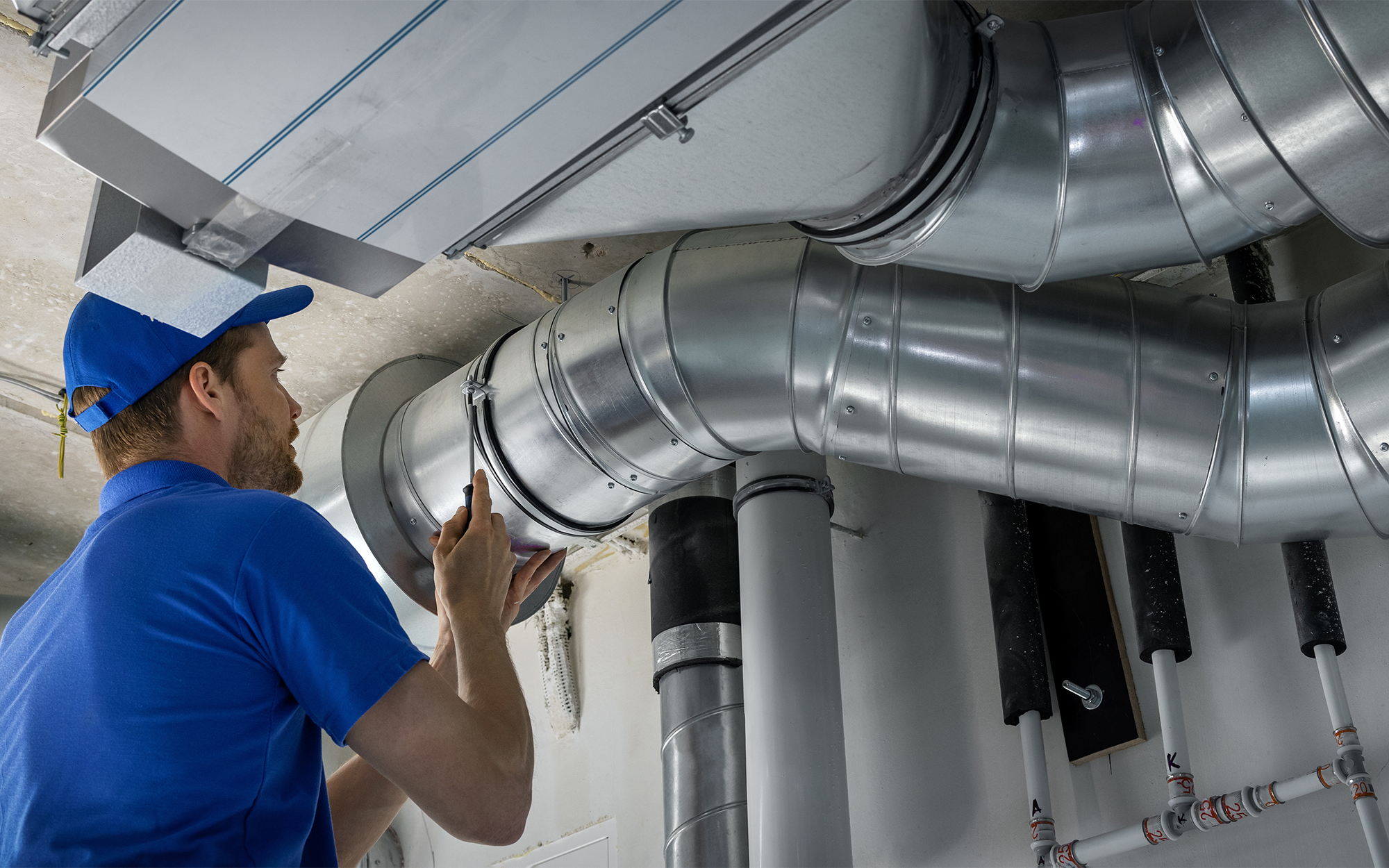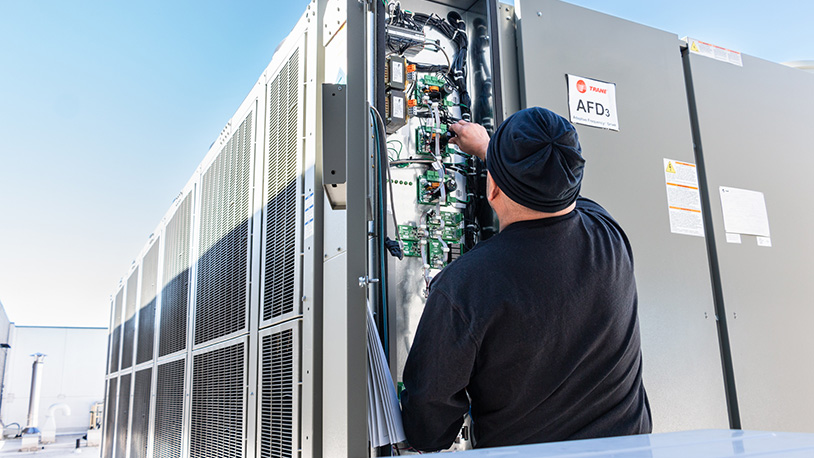Discover how HVAC experts support industrial facility comfort needs
Wiki Article
Exploring the Necessary Elements of an Effective HVAC System
An effective a/c system is developed on several important parts that operate in consistency. Each component, from the thermostat to the ductwork, plays an essential function in preserving convenience and power efficiency. Understanding these aspects is essential for maximizing efficiency and boosting indoor air quality. As one examines these components, the elaborate connections in between them reveal insights right into improving total system performance. What certain variables add most to this performance?The Function of the Thermostat in HVAC Effectiveness

Often neglected, the thermostat plays an essential duty in the efficiency of HVAC systems. This little tool works as the key control center, regulating temperature setups and making certain suitable comfort within an area. By properly picking up the ambient temperature, the thermostat connects with the air, home heating, and ventilation conditioning units to keep the preferred climate
An effective thermostat reduces power usage by activating the cooling and heating system just when required, consequently avoiding excessive home heating or air conditioning. Modern smart and programmable thermostats enhance this performance even more by permitting users to establish timetables and from another location adjust setups, adapting to everyday regimens.
The placement of the thermostat is necessary; improper place can lead to imprecise temperature level readings, resulting in inefficient operation. Overall, a well-functioning thermostat not only improves convenience however likewise adds significantly to power financial savings and the long life of the HVAC system.
Comprehending the Importance of Air Filters
Air filters serve an important function in a/c systems by assuring that the air flowing within a space continues to be healthy and balanced and clean. These filters trap dust, irritants, and various other contaminants, avoiding them from being recirculated throughout the setting. By capturing these particles, air filters contribute to enhanced interior air high quality, which can significantly profit owners' health, especially those with allergies or breathing conditions.Furthermore, keeping clean air filters enhances the efficiency of cooling and heating systems. Stopped up filters can limit airflow, creating the system to work harder to keep preferred temperatures, resulting in increased energy consumption and greater energy bills. Frequently replacing or cleansing filters is a crucial maintenance action that can extend the life-span of HVAC devices. Inevitably, comprehending the value of air filters allows home owners and building managers to take aggressive measures to guarantee a well-functioning, efficient a/c system that promotes a secure and comfortable interior setting.

The Performance of the Heating System and Heatpump
Heating systems and heatpump are vital elements of heating and cooling systems, accountable for providing heat during cooler months. Heating systems operate by home heating air through burning or electric resistance, then dispersing it throughout the home by means of air ducts. They typically provide fast heating and can be fueled by natural gas, power, or oil, depending on the system kind.Conversely, heatpump transfer warmth instead of produce it. They remove heat from the outside air or ground, also in low temperature levels, and move it indoors. HVAC experts. This twin performance permits heatpump to also give cooling in warmer months, making them flexible alternatives for year-round environment control
Both systems need correct maintenance to guarantee efficiency and long life. While heaters master extreme chilly, warmth pumps can be beneficial in moderate climates. Recognizing their distinctive capabilities aids house owners in choosing the most appropriate choice for their heating requires.
Discovering the Air Conditioning Unit
The a/c system is an important part of cooling and heating systems, available in various types to match various needs. Comprehending the efficiency ratings of these units is essential for making educated choices about power intake and cost. This section will explore the diverse sorts of air conditioning system and make clear just how performance rankings impact performance.Kinds Of Air Conditioners
While various factors affect the selection of cooling systems, recognizing the various types HVAC experts offered is critical for property owners and building supervisors alike. Central air conditioners are designed to cool down whole homes or buildings, utilizing a network of air ducts for air flow. Home window units provide an even more localized service, ideal for tiny areas or single areas. Mobile air conditioners give flexibility, enabling users to relocate the system as required. Ductless mini-split systems are another alternative, combining the performance of central systems with the comfort of zoning, as they require no ductwork. Ultimately, geothermal systems harness the earth's temperature for energy-efficient cooling. Each kind features unique benefits, making informed selections crucial for efficient climate control.
Efficiency Rankings Clarified
Recognizing efficiency rankings is vital for selecting the appropriate cooling system, as these metrics provide understanding right into the system's efficiency and energy intake. The most usual rating for a/c is the Seasonal Energy Performance Ratio (SEER), which measures the cooling result throughout a common cooling season divided by the overall electric energy input. A higher SEER suggests much better effectiveness. Additionally, the Energy Effectiveness Ratio (EER) is utilized for measuring effectiveness under details conditions. Another crucial metric is the Power Star qualification, which indicates that a system fulfills rigorous energy performance guidelines. By examining these rankings, consumers can make educated choices that not just enhance comfort but likewise lower energy costs and environmental effect.The Significance of Ductwork and Airflow
Effective ductwork style and airflow management play vital roles in the overall performance and performance of a/c systems. Appropriate ductwork assurances that conditioned air is dispersed equally throughout a room, decreasing temperature level fluctuations and improving convenience. Properly designed air ducts lessen resistance to air movement, reducing the workload on a/c tools and inevitably reducing energy intake.Air movement management entails tactically placing vents and registers to improve the flow of air. This prevents typical problems such as chilly or warm areas, which can happen when air flow is obstructed or inadequately balanced. Furthermore, the best duct materials and insulation can additionally enhance performance by lowering warm loss or gain throughout air transit.
An effective ductwork system not just adds to energy financial savings but can additionally lengthen the life-span of HVAC equipment by reducing unnecessary pressure (HVAC experts). Understanding the relevance of ductwork and air flow is important for accomplishing peak Heating and cooling system performance.
Normal Maintenance Practices to Boost Performance
Normal maintenance techniques are vital for guaranteeing peak efficiency of HVAC systems. These practices consist of regular assessments, cleansing, and essential repair services to keep the system running successfully. On a regular basis altering air filters is vital, as blocked filters can obstruct air movement and reduce effectiveness. Additionally, specialists ought to check and clean evaporator and condenser coils to prevent overheating and energy waste.Yearly expert inspections are also suggested, as experienced technicians can determine possible concerns before they intensify. Lubing relocating parts reduces deterioration, adding to a longer life expectancy for the system. Furthermore, guaranteeing that the thermostat operates appropriately help in keeping optimal temperature control.

Frequently Asked Concerns
Just how Usually Should I Replace My Thermostat?
Thermostats should usually be changed every 5 to one decade, depending on usage and innovation improvements. Normal checks are recommended to guarantee peak performance, specifically if experiencing inconsistent temperature level control or boosted energy costs.What Dimension Air Filter Is Best for My Cooling And Heating System?
The very best dimension air filter for a heating and cooling system differs by device style. Commonly, it's essential to consult the owner's guidebook or check the existing filter dimensions to guarantee peak efficiency and air top quality.Can I Set Up a Warm Pump Myself?
Setting up a heatpump independently is feasible for skilled people, yet it requires expertise of electric systems and neighborhood codes. Employing an expert is suggested to guarantee correct setup and optimal system efficiency.How Do I Know if My Ductwork Is Efficient?
To determine ductwork efficiency, one need to examine for leakages, measure airflow at vents, evaluate insulation high quality, and assess temperature level distinctions between supply and return air ducts. Expert assessments can provide detailed understandings into total efficiency.What Are Indications My HVAC Needs Immediate Upkeep?
Indications that a heating and cooling system requires immediate maintenance consist of uncommon sounds, irregular temperature levels, boosted energy bills, undesirable smells, and frequent cycling. Attending to these issues without delay can avoid further damage and guarantee top system efficiency.Air filters serve a necessary function in Cooling and heating systems by guaranteeing that the air distributing within a space continues to be healthy and balanced and tidy. In addition, maintaining clean air filters boosts the effectiveness of Heating and cooling systems. Ductless mini-split systems are one more choice, combining the effectiveness of main systems with the convenience of zoning, as they call for no ductwork. Understanding effectiveness scores is essential for selecting the best air conditioning unit, as these metrics supply understanding into the system's performance and power usage. The best size air filter for a HVAC system varies by unit layout.
Report this wiki page